Related Research Articles

Thomas Nelson Jr. was an American Founding Father, soldier and statesman from Yorktown, Virginia. In addition to serving in the Virginia General Assembly for many terms, he twice represented Virginia in the Continental Congress, where he signed the Declaration of Independence in 1776. Fellow Virginia legislators elected him to serve as the commonwealth's governor in 1781, the same year that he fought as a brigadier general in the siege of Yorktown, the last battle of the Revolutionary War.

John Crowe Ransom was an American educator, scholar, literary critic, poet, essayist and editor. He is considered to be a founder of the New Criticism school of literary criticism. As a faculty member at Kenyon College, he was the first editor of the widely regarded Kenyon Review. Highly respected as a teacher and mentor to a generation of accomplished students, he also was a prize-winning poet and essayist.

Josiah Thomas Walls was a United States congressman who served three terms in the U.S. Congress between 1871 and 1876. He was one of the first African Americans in the United States Congress elected during the Reconstruction Era, and the first black person to be elected to Congress from Florida. He also served four terms in the Florida Senate.

John Goode Jr. was a Virginia attorney and Democratic politician. He served in both the United States Congress and the Confederate Congress, and was a colonel in the Confederate Army. He was Solicitor General of the United States during the presidency of Grover Cleveland. He was known as "the grand old man of Virginia."
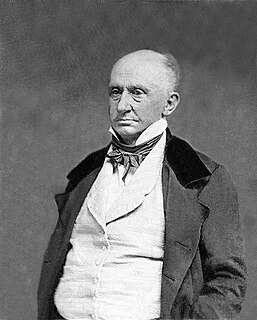
George Washington Parke Custis was an American plantation owner, antiquarian, author, and playwright. His father John Parke Custis was the stepson of George Washington. He and his sister Eleanor grew up at Mount Vernon and in the Washington presidential household.
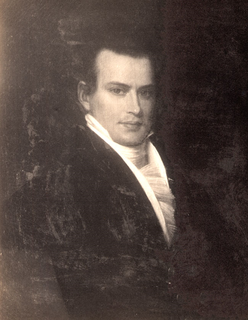
William Cabell Rives was an American lawyer, planter, politician and diplomat from Virginia. Initially a Jackson Democrat as well as member of the First Families of Virginia, Rives served in the Virginia House of Delegates representing first Nelson County, then Albemarle County, Virginia, before service in both the U.S. House and Senate. Rives also served two separate terms as U.S. Minister to France. During the Andrew Jackson administration, Rives negotiated a treaty whereby the French agreed to pay the U.S. for spoliation claims from the Napoleonic Wars. During the American Civil War, Rives became a Delegate to the Provisional Confederate Congress and the Confederate House of Representatives.
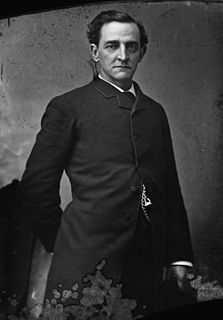
John Warwick Daniel was an American lawyer, author, and Democratic politician from Lynchburg, Virginia who promoted the Lost Cause of the Confederacy. Daniel served in both houses of the Virginia General Assembly and both houses of the United States Congress. He represented Virginia the U.S. House from 1885 to 1887, and in the U.S. Senate from 1887 until his death in 1910.

Thomas Salem Bocock was a nineteenth-century slave owner, politician and lawyer from Virginia. After serving as an antebellum United States Congressman, he was the speaker of the Confederate States House of Representatives during most of the American Civil War.
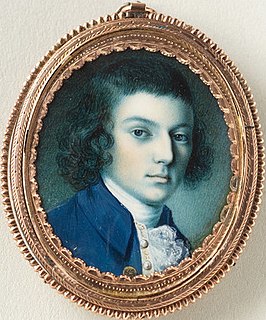
John Parke Custis was an American planter. He was a son of Martha Washington and stepson of George Washington.

Robert Garlick Hill Kean was a Virginia lawyer. A Confederate States Army officer and bureaucrat during the American Civil War, he helped promulgate the Lost Cause of the Confederacy after the war, particularly since he became one of the last surviving members of the Confederate States bureaucracy. His wartime diary, published long after his death, provides insights into the inner workings of the Confederate government.
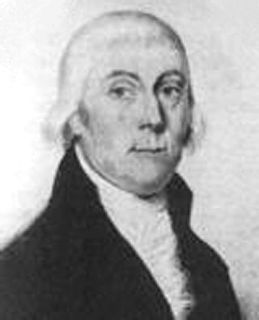
Cyrus Griffin, a Virginia lawyer and politician, was the final President of the Congress of the Confederation and first United States District Judge of the United States District Court for the District of Virginia.

Bushrod Washington was an attorney and politician who served as Associate Justice of the Supreme Court of the United States from 1798 to 1829. On the Supreme Court, he was a staunch ally of Chief Justice John Marshall.
John Thornton Augustine Washington was a prominent Virginia farmer who served a term in the Virginia House of Delegates. Washington was a grandnephew of George Washington, first President of the United States.

Alexander W. Monroe was a prominent American lawyer, politician, and military officer in the U.S. states of Virginia and West Virginia. Monroe served as a member of the Virginia House of Delegates and West Virginia House of Delegates representing Hampshire County. He was the Speaker of the West Virginia House of Delegates during the 1875–1877 legislative session. Monroe also represented Hampshire County in the West Virginia Constitutional Convention of 1872.
Fleming Bowyer Miller was an American lawyer and politician who represented Botetourt County, Virginia in both houses of the Virginia General Assembly during three decades, including in the Virginia Senate following the American Civil War. He also served in the Virginia Constitutional Convention of 1829–1830, Virginia Constitutional Convention of 1850 and the Virginia Secession Convention of 1861.

John Wesley Cromwell was a lawyer, teacher, civil servant, journalist, historian, and civil rights activist in Washington, DC. He was among the founders of the Bethel Literary and Historical Society and the American Negro Academy, both based in the capital. He worked for decades in administration of the US Post Office.
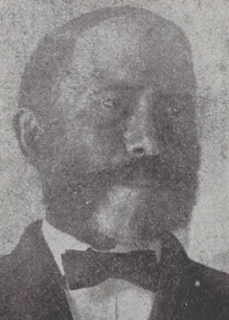
Daniel M. Norton, later Daniel McNorton, was a doctor and state legislator in Virginia. Norton served in the Virginia Constitutional Convention of 1868. He was a member of the Virginia General Assembly, as were his brothers F. S. Norton (1869/71) and Robert Norton.
William B. Zinn was a nineteenth-century farmer, mill-owner, militia leader and politician, who ultimately freed his slaves and became one of the founders of the State of West Virginia.

Marshall Harvey Twitchell was a teacher, officer in the Union Army, and businessman. From Vermont, he became a prominent political figure in Louisiana's post-war Reconstruction, including two terms as a Republican member of the Louisiana State Senate. He was seriously wounded during the Civil War and was shot multiple times in an assassination attempt by white supremacists after the war. He returned north, served as a diplomat in Canada, and wrote a memoir.
Seaborn F. Kennamer was a state legislator in Alabama. He was born in Kennamer Cove. He had 9 children. He served in the legislature in 1869 and 1870 representing Marshall County, Alabama and later served as postmaster of Kennamer Cove. He married Bettie Mitchell from Tennessee in 1869 and farmed Winesap apples.
References
- ↑ "Dictionary of Virginia Biography: Robert Norton" (PDF). Library of Virginia.
- ↑ Kale, Wilford (May 17, 2018). Yorktown, Virginia: A Brief History. Arcadia Publishing. ISBN 9781467139571 – via Google Books.
- ↑ Friedlander, Alan; Gerber, Richard Allan (November 22, 2018). Welcoming Ruin: The Civil Rights Act of 1875. BRILL. ISBN 9789004384071 – via Google Books.
- ↑ "robert_norton". February 26, 2012 – via Flickr.